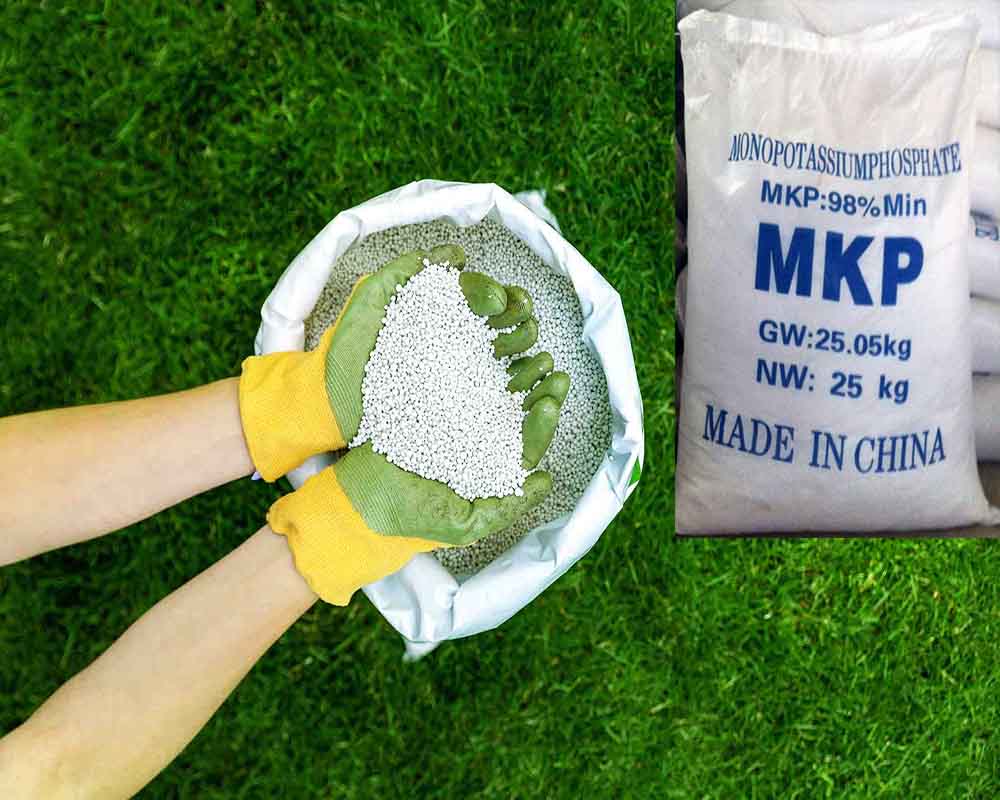📌 Detailed Introduction of MKP (KH₂PO₄) Fertilizer
✔ What is Mono Potassium Phosphate (MKP)?
Mono Potassium Phosphate (MKP, KH₂PO₄) is a highly water-soluble, chloride-free fertilizer providing essential phosphorus (P₂O₅) and potassium (K₂O) to plants. It is widely used in fertigation, foliar sprays, and hydroponic systems to support root development, flowering, and fruit growth.
✔ CAS Number & Chemical Formula:
CAS Number: 7778-77-0
Chemical Formula: KH₂PO₄
📌 Applications of MKP Fertilizer
✔ Agriculture & Horticulture
Highly efficient source of P₂O₅ (52%) and K₂O (34%) for balanced plant nutrition.
Enhances root development, flowering, and fruit formation.
Improves stress tolerance to drought, diseases, and temperature extremes.
Suitable for soil application, foliar spray, and fertigation.
✔ Hydroponics & Drip Irrigation
100% water-soluble with no clogging in irrigation systems.
Ideal for nutrient solutions in soilless cultivation.
Provides fast nutrient uptake with no soil residue.
✔ Foliar Feeding
Quickly corrects phosphorus and potassium deficiencies in plants.
Enhances chlorophyll production, leading to stronger plant growth.
Prevents leaf chlorosis and weak stems in high-yield crops.
✔ Industrial Uses
Used as a pH buffer in food and pharmaceutical applications.
Found in detergents and water treatment solutions.
📌 Production Method & Raw Materials
✔ Raw Materials Used:
Phosphoric Acid (H₃PO₄)
Potassium Hydroxide (KOH) or Potassium Carbonate (K₂CO₃)
✔ Production Process:
Neutralization – Phosphoric acid is reacted with potassium hydroxide or potassium carbonate.
Crystallization – The solution is cooled and crystallized to obtain pure KH₂PO₄.
Drying & Screening – The crystals are dried and screened to the desired granule size.
Quality Testing & Packaging – Ensuring high purity before shipment.
📌 Product Specifications
| Property | Technical Grade | Fertilizer Grade |
|---|---|---|
| Chemical Formula | KH₂PO₄ | KH₂PO₄ |
| Appearance | White powder/granules | White powder/granules |
| P₂O₅ Content (%) | ≥ 52.0% | ≥ 52.0% |
| K₂O Content (%) | ≥ 34.0% | ≥ 34.0% |
| Moisture (%) | ≤ 0.5% | ≤ 0.5% |
| Insoluble Matter (%) | ≤ 0.1% | ≤ 0.1% |
| Chloride (Cl⁻) (%) | ≤ 0.01% | ≤ 0.01% |
| pH (1% solution at 25°C) | 4.4 – 4.7 | 4.4 – 4.7 |
| Water Solubility | 100% | 100% |
| Packaging | 25kg bags or customized | 25kg bags or bulk |
| Shelf Life | 24 months | 24 months |
📌 Famous MKP Brands Worldwide
ICL Fertilizers – Israel
Haifa Chemicals – Israel
Yara International – Norway
Mosaic – USA
Jiangsu Khonor Chemicals Co., Limited – China
📌 Why Choose Jiangsu Khonor Chemicals Co., Limited?
✔ High-Purity MKP – Free from heavy metals & impurities
✔ 100% Water-Soluble – Ideal for fertigation, foliar sprays & hydroponics
✔ Customized Packaging – Available in 25kg, 50kg, and bulk bags
✔ Competitive Price & Fast Delivery – Efficient supply chain & global export
📌 Order High-Quality Mono Potassium Phosphate (MKP) Today!
Looking for a trusted MKP fertilizer supplier? Jiangsu Khonor Chemicals Co., Limited provides premium Mono Potassium Phosphate (KH₂PO₄) with 52% P₂O₅ & 34% K₂O for agriculture, fertigation, and hydroponics.
📞 Contact us now for bulk pricing, samples, and technical support!

